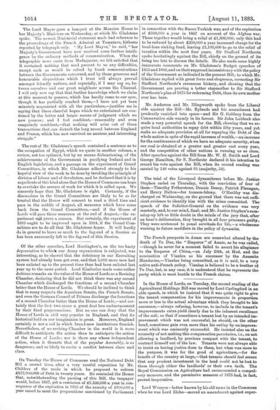In the House of Lords, on Tuesday, the second reading
of the Agricultural Holdings Bill was moved by Lord Carlingford in an able speech, in which he insisted that it was quite right to give the tenant compensation for his improvements in proportion more or less to the actual advantage which they brought to his successor,—always refusing, however, to include in the tenant's improvements extra-yield clearly due to the inherent excellence of the soil; so that if sometimes a tenant lost by an intended im- provement which was not successful, he should, on the other hand, sometimes gain even more than his outlay by an-improve- ment which was eminently successful. He insisted also on the necessity of not making this compensation permissive, i.e., on not allowing a landlord, by previous compact with the tenant, to contract himself out of the law. Tenants were not always able to insist on having justice done to them, but what was more to the purpose, it was for the good of agriculture,—for the benefit of the country at large, that tenants should feel secure that any prudent investment in the land could not be lost. to them through either the landlords' or their own fault. The Royal Commission on Agriculture had recommended a compul- sory measure, and the permissive measure of 1875 had, in fact, proved inoperative.


































 Previous page
Previous page